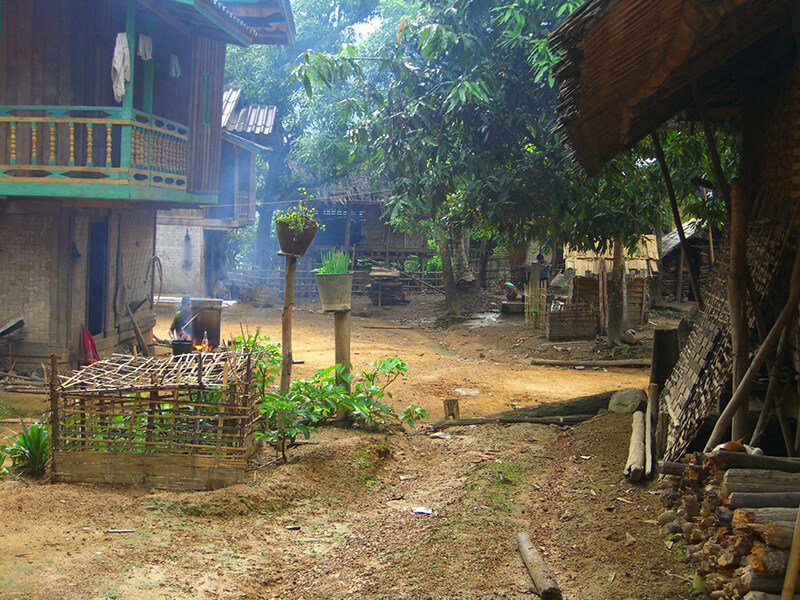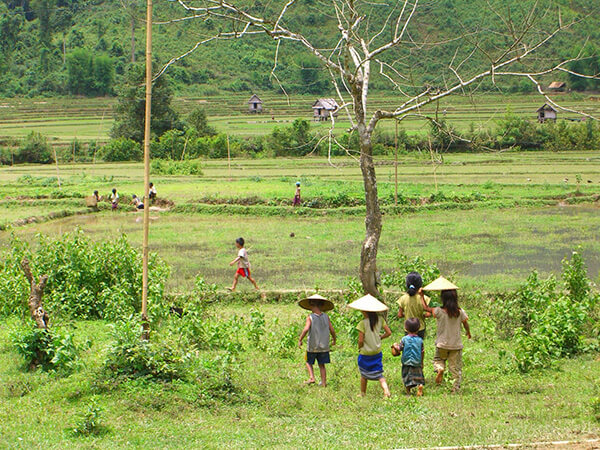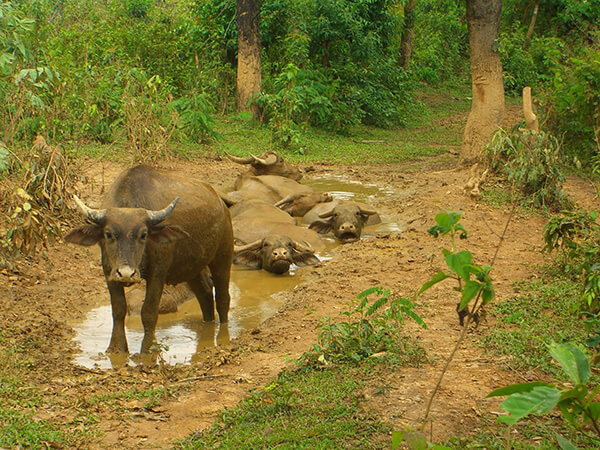Paths Exist in Laos
Article and photos by Kevin Kato
 \ \
The village of Ban An in Laos.
When night descends on Ban An, the isolation feels complete. The closest village, an hour’s walk away, may as well not even exist. The gas lamp on the wooden table casts a glow across the side of Kem’s face as she works on the strap of her sandal, the small epoxy tube in her hand looking very much out of place here in this primitive oasis of civilization. Animals bellow and grunt in the darkness. Hushed words drift in and out from somewhere unseen, voices of children, not at play but at task. The cooling air smells faintly of earth.
Reeb has not yet returned. Kem had expected him to be back the previous morning; still, her face wore no new hint of anxiety. As a stranger in a strange land, I feel the weight of wonder falling on my shoulders. Besides the leeches, I don’t know what dangers might lurk in the mountains of northern Laos.
"Maybe tomorrow?"
Turning her sandal over in her sinewy hands, Kem bears the air of a woman not taken by the specter of sudden catastrophe but encumbered by the constant awareness of the burden of existence.
"Yes. Maybe tomorrow. Maybe morning."
I’d met Kem not entirely by chance; I knew from a conversation with another traveler that a woman in the village down the path had a hut for rent. She had two eight-by-eight wooden boxes on stilts, with small covered porches and no windows. Mine is the closer of the two from where Kem and I now sit and is the only one visible in the encroaching black of night.
Over three days, Kem offered up emotionally stunted fragments about life in Ban An. As I watch her work the strap of her sandal through with a rusty nail, I listen to the words she has left unsaid.
“That first afternoon, I told her, “I was told there was a waterfall in the next town.”
“Yes. You are going tomorrow? Too late today.”
I hadn’t planned on when. “Yes. Tomorrow.”
Kem explained how Sanna was a 3-hour hike along a trail winding through the forest and a mountain ridge. “It’s best if you go barefoot,” she added. I accepted his advice without thought or hesitation. Kem also told me Reeb could go with me if I liked. She gave no indication who Reeb was, only that he was supposed to be back the following day; she could introduce us then, and by the way, would I like her to prepare dinner for me that evening? After pointing out the bathroom, Kem left me to figure out the rest of her world alone.
The path to Ban An is a series of disappearing and reappearing ruts in the dirt, passing through canopied groves, crossing narrow, ambitious rivers, and bringing one past rough, fenced-in fields. As I passed, men were pounding holes in the ground with long wooden poles. Women followed, dropping in handfuls of seed and covering them up. They worked not quickly nor efficiently. Their labor was staccato, as if they were not entirely convinced that their labor would amount to anything, even though they had no other recourse.
As the path nears the village, the land opens up to wider, tamer swaths of the farm, separated by low walls of grass and dirt and clothed in much tidier greens. The entrance to the village proper consists of a break in the cross-post fence and a concisely hand-painted wood sign reading Ban An. The mere existence of such a sign is incongruous without the assumption of the occasional traveler passing through. Yet there is no other hint of foreign influence among the wood frame, bamboo wall, tin roof homes, the dirt of the only road, and the footpaths that string everything together.
As I sought out the woman about whom my traveling comrade had spoken, I encountered a few precious souls. They worked separately and silently, cleaning, mending, or perhaps venturing to further various parts of their existence. I nodded to each of them; each eyed me with an indifference veiled in suspicion, borne of ignorance or maybe familiarity. In my head, I heard the words of a dear friend who had lived for many months in a remote Rwandan village doing research for her anthropology thesis: “You can’t just go up to these people and start asking them questions, you have to let them accept you first, and this takes time.” In a place like Ban An, it feels as though time is just about all they have.
Kem’s two huts stood in a patch of dirt and grass at the far end of Ban An. Nearby, a raised and roofed wooden deck looked out over the irregularly-shaped fields, keeping the surrounding forest at bay. Two men, skin a dark shade of nature, guided their plow-bearing water buffalo in trudging lines through the grass and mud. They worked with bowed heads, glancing up only to check on each other’s progress until the late May evening turned their field gray. They disappeared together, no hint of a conversation passing between them. I remained, allowing myself to be hypnotized by the serenity, listening to the village behind me whisper and settle as night came over the land.
Reeb would not appear the next morning or the rest of the day. The absence, for me, was not a momentary setback but a day’s opportunity as Ban An, like all of Laos, captivates without adornment. The sounds of a new day rise with the first glints of dawn. Iron utensils and subdued voices are a prelude to the shuffle and clatter of another day — in the fields, around the home, along the path to the next village. Women tend to do domestic matters without power or running water. Men lead their beasts with rope and harnesses to coax the earth more. “They need a plow, a machine,’” Kem tells me. “But it is so much money.”
Alone at a table at the edge of the village, I am anything but detached. Observing people unnoticed closes the physical distance. As I watched a woman with a flowing blue skirt gather sticks for her fire, a loose cluster of children tumbled from behind a row of trees. Some were of average schooling age, which made me realize I had no idea what day it was. Their straw hats contrasted with their clothing, sampling Western world cast-offs. They were barefoot and seemed not to notice as they bounced through the half-alive grass. One by one, they stepped onto the raised edge of the nearest field and jumped off, shouting and shrieking as they splashed around in the muddy water of an irrigation ditch. They yelped and played, indistinguishable in spirit from Japanese school children in a bleach-clean swimming pool or half the neighborhood around an open New York City hydrant. I drank in the scene from Kem’s table, aching to join them, tethered by the absolute perfection of a moment I didn’t want to interrupt or end.
 \ \
Kids are engaged in play in Ban An.
Young souls sated, and they slowly dispersed. Two of the kids led a third younger boy across Kem’s grass. I tapped my pen against my notepad until one of them looked up. His quiet burst of surprise brought the others’ faces to mine, and in the time it took to smile, they understood, as I did now, that we had just spent several hours together in the same world. They giggled and bounced out of sight. I climbed down from my perch to navigate my barefoot way across the prickly grass and through the muddy water down to the river where Kem had told me the path to Sanna begins. The men in the fields kept at their labors. The sun dashed across the sky. Reeb was neither seen nor mentioned as Kem prepared a dinner of rice and vegetables for me as there was no meat that day.
The dishes, the sun, and Kem were long gone when a girl of about eight climbed up the short ladder, plopped down at the table, and slid a notebook out of her ratty Barbie knapsack. Without a word or a look my way, she began working, writing numbers and letters on lined pages in no manner I could discern and no language I knew. I put down my pencil and leaned over, close enough to pull her nose out of the page. I smiled. ‘Very nice!’ Her hair fell over her face as she put her head down again, not relatively fast enough to hide her flustered grin.
For an hour, not another word passed between us, cementing my suspicion that she was there despite my presence, not because of it.
Bugs flit in erratic circles around the gas lamp on the table. Kem’s hands rise before her and fall out of sight again as she mends her sandals. Her wrists are naked, and I wonder what time it is. Not for me, for I have become well-accustomed to sleeping with the stars and waking with the sun, but for the children whose quiet voices continue to ebb and flow from the darkness.
“The waterfall was beautiful,” I say. Kem nods without looking. I scratch at the faint leech marks on my toes, wondering why she would tell me to go barefoot. Or why I listened. Over the next few days, an answer would slowly come to me. Going barefoot seems practical for Kem and the rest of Ban An; sandals don’t go well with river crossings and muddy mountain trails. For me – and I wonder to this day whether Kem knew it or not — keeping my sneakers on would have made the experience little more than a walk through the woods.
It’s best to keep a stick in your hand. Leeches can latch onto your feet no matter how fast you are running, and trying to pull them off with your fingers gives them more time to tighten their suckers as their friends on the ground get busy burrowing into the skin between your toes. As I ran through the mud and wild grass, jumping roots, rocks, and opaque brown puddles, I wondered whether the locals carried sticks too or waited until they got home to scrape all their leeches off.
The path had begun steep, rising muddy from the banks of the river. Drier dirt and grass predominated as the land slowed its ascent and then leveled off. In places, ruts in the soft earth told tales of wheeled vehicles passing through, though it seemed unlikely the trail would ever see the likes of even an ox cart. Around a bend, I came upon a small herd of water buffalo lazing in a massive mud puddle; further on, a wooden fence stood across the path, ready to keep them from wandering too far. I encountered nary a soul until I came upon the wood and bamboo of the signless village of Sanna.
 \ \
Encounter with a buffalo on the way to Sanna.
Surprisingly, Sanna was more extensive and more complex than one-road Ban An. A maze of homes and pathways spread over the undulating crest of a hill, nothing but the forest and more hills in every direction. There were no adults. Young children were everywhere, dressed in dirty clothes or underwear or nothing but their dirty skin. Two of them smoked suspicious-looking cigarettes as they gazed at me through cloudy eyes. None of the kids looked above ten years, yet something in their manner told me they’d lived for many more. I saw no toys, no balls, or bicycles as they tightened in a circle around me.
I greeted them in English and with gestures. They responded to each other as much as to me in their own words. They reached out, some to shake my hand, some to prod. We shared but one idea, conveyed in the only word we both knew: waterfall.
They could have been leading me straight into the jaws of hell for all I knew. The path barely wavered as we descended along a chute of mud and leaves. All around me, the children laughed and shouted as they climbed over and through the brush. More of them seemed to be naked now. They swung from branches like monkeys at play. They gathered berries, dropping them into my empty water bottle. They howled in delight as I slipped through the mud, grabbing wildly at branches, sliding into bushes and tree trunks, cursing the same incorrigible ground these kids had thoroughly mastered. The world I knew was as far away as it had ever been.
The sound and then the sight of the waterfall were not an end to the torturous game; it was merely a blessed respite. I would have lingered alone on the rocks and swum at a snail’s pace. At this moment, I needed Laos and all her gentle quiescence. Instead, the children leaped into the pool at the base of the falls and scolded me, so I believed, for every second, I remained with my feet on the semi-dry ground. They splashed each other, then began splashing me. They climbed up rocks and jumped right back down, their delirious smiles daring me to do the same.
Thirty minutes later, as I was clambering back up that mountainside of mud, drenched and bruised, and the long trail back to Ban An still in front of me, the kids did something I never expected. They abandoned me. They took off up the hill and back to their village, which had also disappeared when I reached the top. There was no trail. No footprints. No sign or sound of the children of Sanna or of Sanna itself. I was alone, wet and barefoot, and suddenly faced with the notion of being lost in these woods, these mountains, for much longer than I’d bargained for. How many children under ten left to play all day under no adult’s care have ever gotten lost out here? My thoughts then switched to Reeb, and I jogged off, searching for Sanna in a subdued panic.
My former companions seemed neither surprised nor interested when I finally returned. As I passed, the two smokers approached, stood, and stared from a few feet away. Their eyes were dark and complex. I saw a message in them, one of confidence and arrogance and contempt. I was in their world, and I was welcome to leave. Back below Sanna, I discovered two faint but distinct paths, running off not in opposite directions but as the legs of a wandering triangle. Glancing around at the eternal, unchanging forest, I wasn’t sure which one to take. I looked back; the children had lined up along the fence at the top of the hill, watching as if they knew what was coming. I pointed down one path, and they rose in a clamor, pointing and urging me. I then pointed down the other path; again, they pointed with me, inviting me to go ahead and see where it might take me.
Again, I motioned to the first path and then to the second. Again, there was a wave of encouragement both ways. Except, I saw, for two little girls. They had pointed one way but not the other. I raised a hand to them and trotted off, praying for the next hour to whatever god existed for that cattle guard to appear around the next bend in the path.
The children’s quiet voices seem to have suddenly gone silent. I watch Kem tie off the strap of her newly mended sandal. My feet ache from a million sharp rocks and knuckled tree roots. I feel an overriding urge to ask her if she went barefoot to Sanna, too — or if she ever even went. Instead, I keep quiet and continue listening to what she isn’t saying.
Kem stares down at her sandal, maybe one thought in her head, maybe too many.
"I leave tomorrow," I say, although she already knows. "Thank you. It’s nice here."
She looks around at the darkness. "Yes..." After a silent moment, she turns to me. "Good you see the waterfall…"
"…I wanted to go with Reeb."
For a short eternity, our eyes remain locked. Kem looks into me like I know something I shouldn’t — or she should.
"He’ll be back tomorrow, probably."
Kem brushes her fingers over her sandal. "Yes. Maybe tomorrow."
On the path back to Muong Ngoi the following day, I passed a man about my age. He has a sack slung over his shoulder, and his sandals are in one hand. As I step to the side to let him pass, I speak.
"Good morning, Reeb."
His expression softens, if only a little, as he gazes at me quickly before continuing.
The isolation of Ban An is an illusion that dissolves not with the sun but in time. Men and women work, albeit with different tools. Children play and laugh and learn in their own way, the universal way. Paths exist, leading to Sanna and further into the mountains, back to Muong Ngoi, Luang Prabang, and the rest of the world.
In northern Laos, it doesn’t take long to feel completely isolated. It takes a little longer to realize that the isolation is never complete.
Kevin Kato is an avid writer and incurable traveler. He is the author of numerous novels and publications.
|
